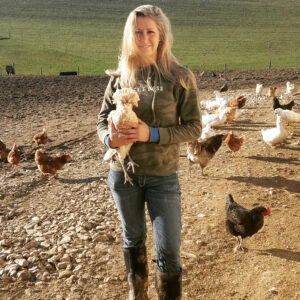Mandy Fedinetz noticed a few dead birds in her flock of laying hens one morning in September. She thought it was weird, but death is a part of life on the farm.
The next day, there were even more dead birds and others were visibly sick. She knew something was terribly wrong.
“Day two it was very sad. I could see them declining by the hour,” she said. “I made a phone call right away to the state hotline.”
Fedinetz’s Primrose Farm, in McDonald, Pennsylvania, was hit by highly pathogenic avian influenza, the first and only confirmed case in domestic poultry in western Pennsylvania. The U.S. Department of Agriculture confirmed the farm was positive on Sept. 19.
More than 4.2 million birds have been culled statewide due to the bird flu in 17 commercial flocks and three backyard flocks, which includes Fedenitz’s flock. She had about 1,800 birds that were culled in an effort to stop the spread of the highly contagious and fatal avian disease.
That included Pekin ducks, Coturnix quail, broiler chickens and a variety of chickens that made up her laying flock. Fedinetz spent nine years building the flock to lay a variety of colored eggs, she said.
“The chickens were special because I spent so many years getting all those different breeds,” she said. “It’s going to take a long time to rebuild that.”
Spread
It’s believed wild birds brought the flu to her farm in Washington County, she said. Her chickens and ducks are pastured and have free range of the farm.
“I have wild geese and ducks floating on the pond,” she said. “It’s a beautiful scene. Meanwhile, they’re carrying a disease you have no control over.”
In the spring, after she heard about the risk from the bird flu, she limited visitors to the farm, disinfected shoes and clothes and kept things clean, but confining her birds was a step she wasn’t willing to take.
“Giving them pasture privileges is what they deserve,” she said. “They had happy lives. They did what they were supposed to. They made an excellent product. That’s the risk you take.”
Highly pathogenic avian influenza is naturally occurring in wild birds that often do not appear sick. The virus is spread in their droppings, meaning it can basically fall from the sky onto a person’s farm. It’s a particular risk for farms during the fall bird migration season.
This strain of bird flu, H5N1, is highly contagious and often fatal to domestic birds, including chickens, ducks, geese, turkeys, guinea fowl and pheasants, but is not a risk to humans. It can cause sudden death without clinical signs. Symptoms also include lack of energy and appetite, nasal discharge, coughing; sneezing, lack of coordination, decreased egg production and diarrhea.
An outbreak in the spring hit the heart of Pennsylvania’s commercial poultry industry in Lancaster and Berks counties, impacting 4 million birds in 17 flocks.
More than 46 million birds in 40 states have been impacted nationally. Each time a flock tests positive, the entire flock must be culled to prevent further spread. State and federal agencies then work together to conduct testing and surveillance in a 10-kilometer radius around the infected farm.
Recovery

Fedinetz said the state department of agriculture responded quickly to her call, sending someone out to test the birds on her farm. Once it was confirmed to be the bird flu, the state and U.S. Department of Agriculture worked in tandem to deal with everything.
Fedinetz said they were great to work with and handled everything well, but that didn’t make it any easier to say goodbye to the birds that allowed her to make a living from farming.
She started raising chickens nine years ago as a hobby, but it grew into her full time job. She sold eggs wholesale to restaurants and markets, as well as selling off the farm from an honor fridge.
Though she had hundreds of chickens, they each had personalities that she got to know.
“There’s the one that makes a god awful commotion when she’s on the roost. There’s the one that jumps on the side-by-side and wants a ride,” she said. “They weren’t just a paycheck. I do it because I love it and I want to give them a good life.”
She was compensated by the USDA at market value for the birds that were culled, which she called a “pittance” compared with what she paid for them and what she would’ve earned from the eggs they would have laid. She should also be eligible for funding from the Pennsylvania Department of Agriculture’s HPAI Recovery Reimbursement Grant program that compensates farmers for losses outside what the USDA covered.
Fedinetz must wait 150 days before she can have the farm tested to see if it’s free of the bird flu. After several rounds of testing to confirm, she can restock.
Until then, it’s quiet at the farm that just a few weeks ago was teeming with life.
“It’s like a nightmare,” she said. “I wake up in the morning and it’s quiet. I don’t hear them crowing. You’d hear one rooster crow and one would answer back.”
In the meantime, she’s relying on her certified cottage kitchen to pay the bills. She also makes and sells jams, jellies, preserves, pickles and pies. She plans to up her pie production while the birds are gone. The farm website with a list of products and sale locations is primrose.farm.
A friend also created a GoFundMe to help Fedinetz get by while she builds her business back. The link is gofund.me/fbd16476.
***
If you suspect your poultry is infected with avian influenza, report your concerns 24 hours a day, 7 days a week to the Pennsylvania Bureau of Animal Health and Diagnostic Services at 717-772-2852, option 1.
Sick or dead wild birds should be reported to the Pennsylvania Game Commission at 610-926-3136 or pgc-wildlifehealth@pa.gov.











